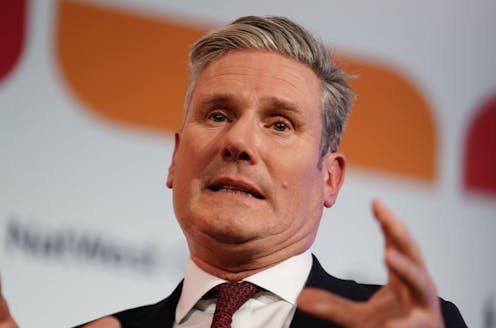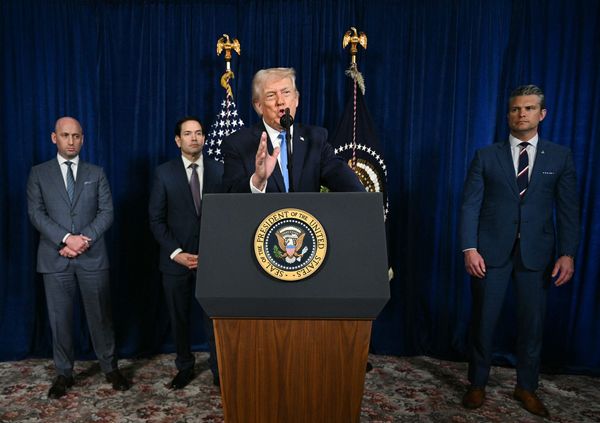
Personality is not everything in politics, but it can go a long way. The UK’s next general election, set to take place in 2024, is already shaping up to be a “battle of the dull”.
The prime minister, Rishi Sunak, may not have presided over quite the same level of chaos as Boris Johnson but nor does he have the personality of the man who led the Conservatives to election victory in 2019. Meanwhile, the Labour party’s leader, Sir Keir Starmer, is also widely described as being boring.
British voters will likely face a choice between leaders who lack charisma or are seen as managerial – between courtroom (Starmer) and boardroom (Sunak). Our recent research suggests that party leaders are well served by paying attention to their personal appeal as the election approaches – particularly the way they smile.
Carried out in the week leading up to the December 2019 general election, our experimental study analysed emotional responses to the three major political leaders at the time: Boris Johnson, then Labour leader Jeremy Corbyn and Liberal Democrat leader Jo Swinson.
A total of 546 potential voters took part in the study. All could be considered partisan, meaning they had a declared political preference.
For the study, we asked participants to watch campaign footage of the three leaders then report the extent to which they felt happiness, affinity, anger or distress in response to different ways that each politician smiled. Importantly, not all smiles are equal. Some convey “affiliation”, or a desire for social interaction, while others convey what is termed “reward” and indicate merely that the person smiling is feeling happiness.
Affiliative smiles engage the main muscles typically used for smiling, such as the zygomaticus major, which pulls the corners of the mouth upward. Reward smiles engage this muscle too, but also involve the orbicularis oculi, which produces wrinkles around the eyes. This fosters an overall impression of softness, which is sometimes associated with empathy. The combination of the masseter, a muscle involved in chewing, and the depressor labii inferioris, which exposes the teeth, may also result in a slight jaw drop.
Johnson’s grin
Participant emotions were measured in response to all three leaders as they displayed both affiliative and reward smiles. Ultimately, we wanted to know if the facial expressions of political leaders had any impact on political attitudes and decisions.
Our results showed that only one type of smile from one leader – the affiliative smile of Boris Johnson – had any significant influence. His smile drove the highest degree of positive affect across the partisan divides. In other words it didn’t matter if you intended to vote for Johnson, Corbyn or Swinson, if you saw Johnson’s affiliative smile, you felt good. The smiles of Corbyn and Swinson failed to generate a significant shift in participant emotion – as did Johnson’s reward smile.
A smile alone can’t win an election but Johnson’s strengths are precisely Sunak and Starmer’s weaknesses. Beyond party policies, the personal appeal of Johnson to enough voters saw him take the Conservatives from a minority government to a huge majority.
Smile, 2024 is just around the corner
These findings highlight the importance of considering the role of emotional responses in politics. Johnson’s personal appeal as a politician clearly transcended his party’s policies. Whatever else voters might think of him, this appeal is precisely what Starmer and Sunak are striving for.
Indeed, our study showed that Johnson appealed emotionally to people who weren’t planning to vote for him, not unlike the appeal that Ronald Reagan, Bill Clinton and Barack Obama had for certain crossover voters in the US. Recognition of the affective dynamics between leaders and followers could be decisive in the context of 2024, when votes feel exceptionally up for grabs.
The upside for the likely “managerial” leaders of next year’s election is that charisma is not innate but can actually be taught. Sunak and Starmer can still leverage the power of emotional responses by paying attention to their facial behaviour and ensuring they display the right type of smile in the right context. This may help them connect with voters. We’ve seen that even small gestures and behaviours can have a significant impact on political attitudes – and, with a tight race ahead, every gesture counts.
This work was carried out as part of an ongoing collaboration on the role that non verbal displays may have in political settings with Professor Patrick A. Stewart (University of Arkansas, USA).
Erik P. Bucy and Nick Lee do not work for, consult, own shares in or receive funding from any company or organisation that would benefit from this article, and have disclosed no relevant affiliations beyond their academic appointment.
This article was originally published on The Conversation. Read the original article.







